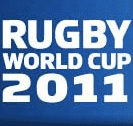The Rugby World Cup could inject as much as $US1.67 billion into the global sports economy and $US654 million to the New Zealand economy, thanks to the influx of international visitors to the host country.
According to the MasterCard Worldwide ‘Economic Impact of Global Rugby Part IV: Rugby World Cup 2011’ report, sport associated economic activity could be worth some $US11.7 billion ($A11.4 billion) to the New Zealand economy by the end of the decade.
The latest installment of the MasterCard report examines the value of RWC 2011 by looking at the short-term commerce flow through international fans spending in bars, clubs, shops, hotels, bookmakers and inside host stadia, along with spending by sponsors and organisations on marketing in the cities around matches.
It also examines the longer-term economic impacts on New Zealand’s economy and the legacy of the Tournament as a whole.
According to Centre for the International Business of Sport (CIBS) Researcher Dave Arthur said the 2011 World Cup Tournament would stand out from its predecessors.
“This Tournament will be like no other: it will attract stronger than ever interest across the world, which will in turn boost commercial interest in and activity around the event.”
The report found that by the end of the decade, consumer expenditure in the New Zealand sports economy could be worth up to US$1 billion. Increased tourism, civic sponsorship and business development resulting from the Tournament is estimated to be US$1.21 billion, whilst the number of people working in sport-related occupations could rise to between 52,000 and 58,000 by the end of the decade.
The Rugby World Cup 2011 by numbers:
- US$224.5 million ticket revenue based on sales of 1.35 million tickets;
- US$204.1 million to be spent on accommodation during the Tournament;
- US$187.7 million to be spent on food and beverage;
- 7.5 million litres of beer to be poured;
- 7.35 million pies and sausages to be consumed; and
- 150,000 litres of sports drinks to be consumed.

